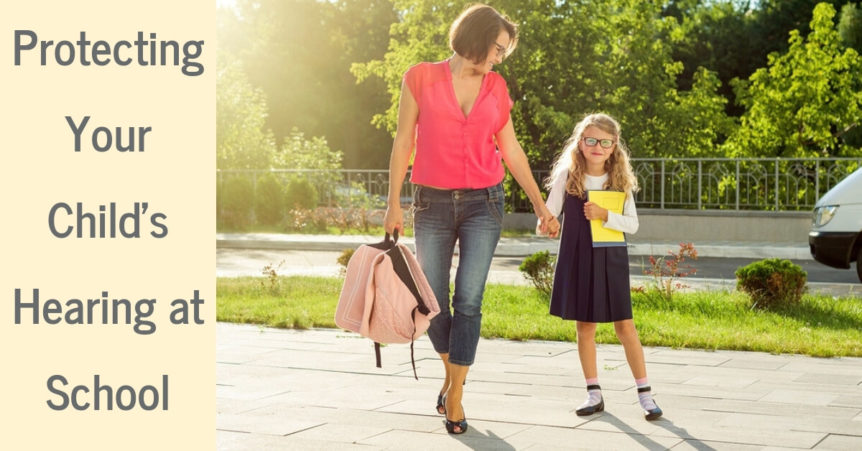Now that school is back in session, children from all walks of life are gathering together in noisy hallways, playgrounds, gymnasiums, and classrooms. There are loud band practices to consider, and the raucous sounds of crowds at sporting events. This is an exciting time, but it is important to consider your children’s hearing health.
Sustained exposure to loud noises can cause permanent hearing loss—and hearing loss can affect people of all ages. As you and your child get back into the school life, there are some important things for you to remember, and for you to communicate to your child about establishing healthy hearing habits early on.
Understanding Hearing Loss
Perhaps one of the first things you can do to address the risks of hearing loss is to simply teach your child the ins and outs of how the ear works, and to understand the causes and symptoms of hearing loss.
Two of the most common forms of hearing loss are sensorineural and conductive hearing loss. Everybody has tiny hair cells in their inner and outer ears, and they are part of a larger system that is responsible for transmitting sound waves to the brain. With sensorineural hearing loss, these hairs may have become damaged due to exposure to loud noises. This means that fewer and/or less complex auditory signals are transmitted to the brain.
The other common type of hearing loss, conductive hearing loss, occurs when there is a blockage between the outer ear, the middle ear, and/or the middle ear. This makes it difficult if not impossible at times for sound waves to travel. When this happens, louder sounds can become muffled and softer sounds can sometimes not be heard at all. Depending on the age of the people you are discussing how hearing works, you may find it useful to search YouTube and other internet outlets for helpful videos and image-based media to describe this process.
Recognizing the Signs of Hearing Loss
The signs and symptoms of hearing loss can include a ringing, buzzing, whirring, or clicking sound that only the hearer can sense (this is also called “tinnitus”). Children with undiagnosed hearing loss may find it difficult to follow along with the teacher in class, especially when their back may be momentarily turned toward the whiteboard, for example, instead of facing the students. They may frequently say “what?” and “huh?” in otherwise clear hearing conditions.
It may be especially difficult for children with hearing loss to participate in group activities—either in the classroom or on the playground—where there are several conversations happening at once and where there is background noise. This is because, for some people with hearing loss, they can find it difficult to create hierarchies of sound: to distinguish a single voice amongst many. They may in fact be able to hear, for example, but find it quite difficult to understand the precise words a given person is saying.
Protecting Your Child’s Hearing
When considering how to best protect your child’s hearing at school, perhaps the first thing to do is to schedule a hearing test with hearing professional. Hearing tests are safe, non-invasive, and cause no pain whatsoever. Familiarizing your child with audiologists and hearing tests early on will go a long way in helping them to understand that addressing hearing health is just as important as visiting medical doctors and mental health practitioners for the variety of visible and invisible maladies they may experience in their lives.
After that, there are a few things you can do to protect your children’s hearing at school:
- Have your child carry ear plugs that they can use when they know they will be attending loud events such as pep rallies and sporting events.
- If your child is a member of a school band, it might be a good idea to invest in high quality earplugs. There many custom-made earplugs that provide a range of assistance, from simply lowering the volume of sounds to filtering certain sounds.
- Pay close attention to the volume at which your child listens to their headphones. In-ear headphones can cause particular damage to people, as the devices allow sound to be directed as closely as possible to the ear drum. Sustained listening at even mid-level volumes can cause permanent hearing loss. Try to limit your child’s listening devices to 60 minutes and at 60% of maximum volume.
- Raise awareness of noise-induced hearing loss at your child’s school. This may mean conferencing with administrators and nurses about incorporating hearing health into curricula, hanging posters about how the ear and hearing loss works, or simply introducing students to healthy hearing habits as a matter of course.
At Neighborhood Hearing Aid Center, we provide comprehensive hearing health services for people with hearing loss. Contact us for more information on hearing health practices or to schedule a hearing exam.

